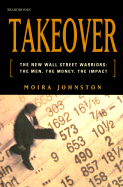|
|
|
|
||||||

|
Takeover: The New Wall Street Warriors: The Men, the Money, the Impact
By Moira Johnston 2000/05 - Beard Books 1893122840 - Paperback - Reprint - 411 pp. US$34.95 What is new in this book is not takeovers, but the size, the hostility, the destructive implications for the corporations, and the introduction of the individual entrepreneur into the game. Publisher Comments A penetrating view of corporate takeovers selectively chosen to give a balanced perspective of the people, processes, and the issues of the takeover wars of the 1980s. Moira Johnston describes in well-researched detail the leveraged buyouts, the proxy fights, tender offers, and the negotiated mergers that defined these financial wars. From the back cover blurb: A penetrating view of corporate takeovers selectively chosen to give a balanced perspective of the people, the processes and the issues of the takeover wars of the 1980s. Moira Johnston describes in well-researched detail the leveraged buyouts, the proxy fights, tender offers, and the negotiated mergers that defined these financial wars. The new Wall Street warriors did not invent takeovers. What was new was the size, the hostility, the destructive implications for the corporations, and the introduction of the individual entrepreneur into the game. Review by Gail Owens Hoelscher Takeover is a well-researched, evenhanded account of three 198Os corporate takeover wars: Crown Zellarbach, TWA, and Unocal. The author selected these three as examples of the leveraged buyouts, proxy fights, tender offers, and negotiated mergers that characterized the era. The cases demonstrate how the fate of corporations intertwine, with Texaco, Getty, CBS, Revlon, Household, and Union Carbide also playing roles. Takeover is also a precautionary tale, The author characterizes the takeover phenomenon as a social issue and places it in the continuum of U.S. business history. Ms. Johnston paints in broad strokes, lamenting the clash the takeover wars represent between "two conflicting elements in our national character; the capitalist, who has marched to the beat of Adam Smith's free trade theories since the nation's founding; and the humanist, marching to nonmaterialist values, who tries to buffer the poor from the law of the jungle with benevolent social programs," What made these megadeals feasible was the convergence of several dynamics. First, the existence of many companies with stock prices below the appraised value of their underlying assets. Second, the recent emergence of institutional investors, who owned large blocks of stock and whose jobs depended on quick profits. Third, risk arbitrageurs who bought up stock as soon as a bid was announced, driving stock prices up further. And finally, junk bonds that attracted larger sums of money than ever could have been attained through traditional channels. Johnston scrutinizes the players themselves: lawyers, investment bankers, arbitrageurs, entrepreneurs, money managers, and financial analysts, seeking to find what drives them. She admires them as individualists in the true American mold, exemplifying the ultimate American dream. She believes they act in defiance of the "code of gray caution lived by post World-War corporate man [that] falls pitifully short of a full-blown experience of life." But, she questions their disregard for the long-term consequences of their actions on companies, employees, communities, the economy, society as a whole, and even national security. Takeover speaks to laymen and professionals, with a style that combines technical description and delightful readability. Here's a description of Nicholas Brady of Dillon Reed: "He is tall and elegant, with a lean, patrician face and a gracious manner that lets him serve wax paper-wrapped roast beef sandwiches at his boardroom table as if it were a champagne hunt breakfast." Ms. Johnston's extensive research yields brilliant quotes, such as Ivan Boesky's closing remarks in a speech to UC Berkeley business school students: "Greed is all right by the another deal," And Ivan Boesky's closing remarks in a speech to UC Berkeley business school students: "Greed is all right by the way. I want you to know that I think greed is healthy. You can be greedy and still feel good about yourself,"  Moira Johnston was born in British Columbia. She has been a radio writer/broadcaster, an investigative journalist, and the author of seven books of non-fiction and dozens of articles. Her books and articles have covered many different themes but almost always deal with major contemporary social issues. She has written for such publications as the New York Times Magazine, Vanity Fair, National Geographic and Esquire. Perhaps her most
famous book is The Last Nine Minutes: The Story of Flight 781 -- an investigative account of the Paris air disaster of March 3, 1974. She collaborated with Trevor Rees-Jones on The Bodyguard's Story, released in March 2000. Ms. Johnston currently resides in Napa Valley, where she founded Friends of the Napa Valley, an environmentalist group. Moira Johnston was born in British Columbia. She has been a radio writer/broadcaster, an investigative journalist, and the author of seven books of non-fiction and dozens of articles. Her books and articles have covered many different themes but almost always deal with major contemporary social issues. She has written for such publications as the New York Times Magazine, Vanity Fair, National Geographic and Esquire. Perhaps her most
famous book is The Last Nine Minutes: The Story of Flight 781 -- an investigative account of the Paris air disaster of March 3, 1974. She collaborated with Trevor Rees-Jones on The Bodyguard's Story, released in March 2000. Ms. Johnston currently resides in Napa Valley, where she founded Friends of the Napa Valley, an environmentalist group.
This list includes only the major players featured in this book. They have been selectively chosen to give a balanced view of the people, processes, and issues of the takeover wars. May other firms and individuals were involved in the corporate control struggles listed below. Key to the Lineup:
|
||||||||||||||||||||||||||||||||||||||||||||||||||||||||||||||||||||||||||||||||||||||||||||||||||||||||||||||||||||||||||||||||||||||||||||||||||||||||||||||||||||||||||||||||||||||||||||||||||||||||||||||||||||
|
|
|
home
| about us
| contact us
| related
sites |